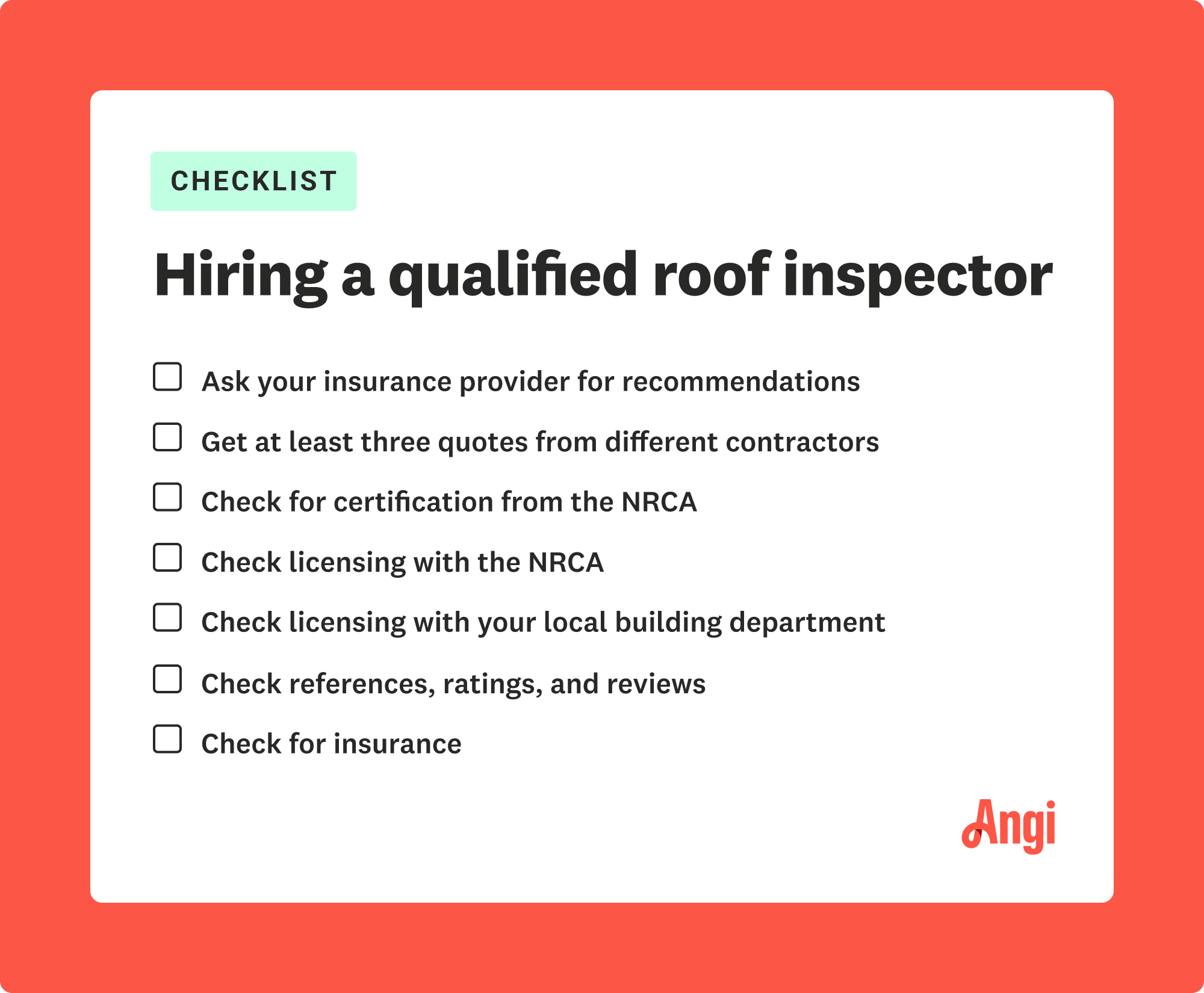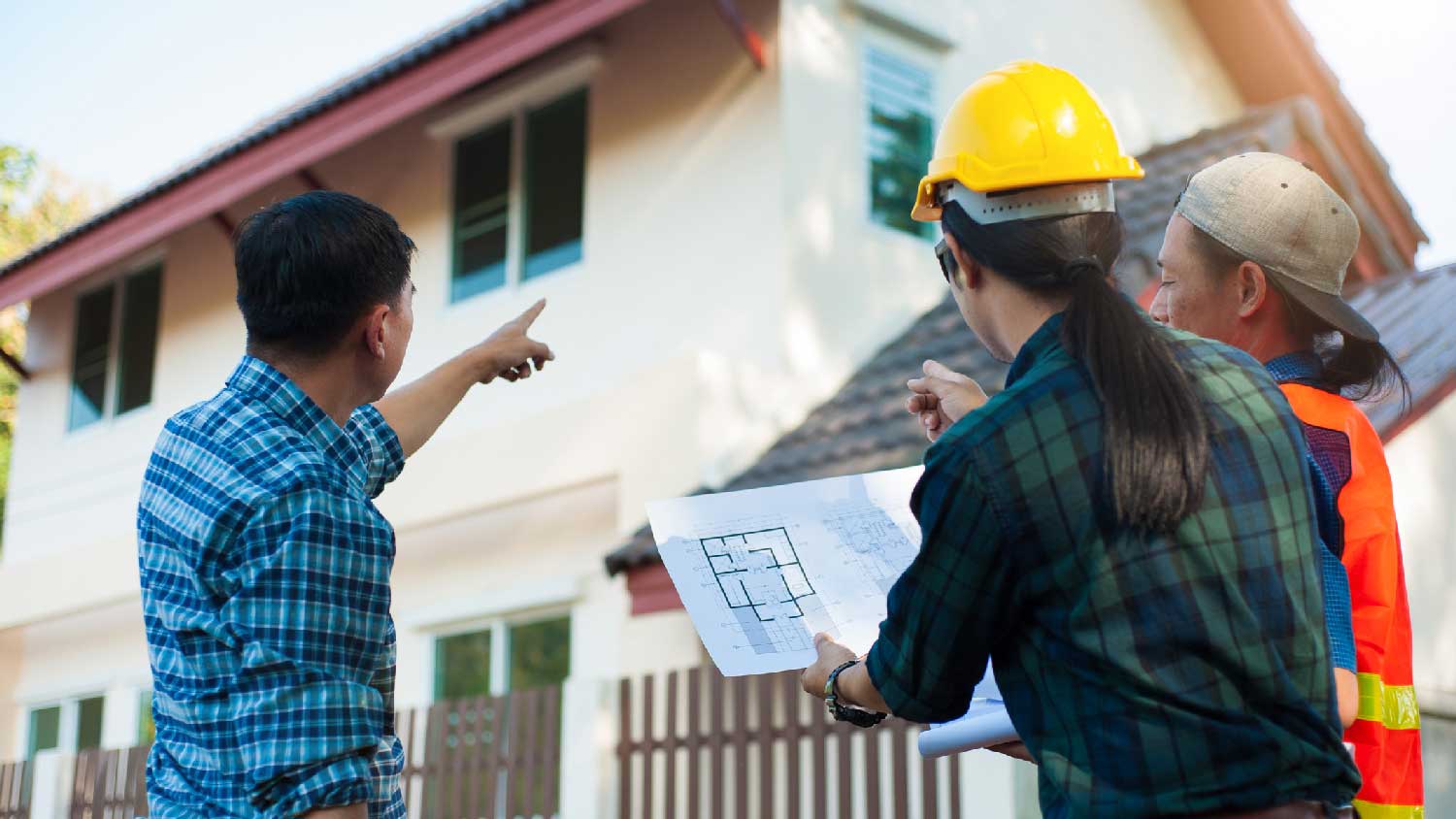How to Hire a Roof Inspector: Everything You Need to Know
Rely on referrals, reviews, and inspector interviews for the best results


In most states, roof inspectors need a home inspector’s license and insurance to comply with local regulations. It’s also a good idea to hire a roof inspector licensed by the NRCIA (National Roof Certification & Inspection Association) and with a home inspector’s license from InterNACHI (International Association of Certified Home Inspectors).
In this roof inspector hiring guide, we’ll explain how to hire a reliable roof inspector and what to expect throughout the process.
What Services Do Roof Inspectors Offer?
Roof inspectors take a close look at all the various parts of a roof. That includes everything from the materials used and the state they’re in, to your soffit and fascia. They’ll inform you of any damages or maintenance needs, and from there, it’s your job to get in touch with roofers who can perform the necessary fixes. However, if you’ve hired an inspector who is contracted to a larger roofing company, they may also be able to provide installation and repair services in addition to an inspection.
Here are all the basics that roof inspectors offer:
Material inspection: Roof inspectors will take a close look at all the materials on your roof and how they’re performing. On roofs with shingles, they’ll take note of any that are curling, cracked, or otherwise broken. They’ll also look for loose seams or damaged panels on metal roofs, and pooling, blisters, or punctures on flat roofs.
Structural inspection: These pros will investigate all the load-bearing elements of your roof, including the soffit, fascia, and gutters, to make sure they’re nowhere close to collapsing. They’ll also look for any signs of sagging and hunt down the culprits causing the issue.
Installation assessment: Improper installation is one of the biggest culprits behind untimely roof damage. Inspectors will first look for signs like poorly placed flashing around chimneys and vents or sealants that aren’t fully sealed.
Interior inspection: Sometimes, a roof appears perfectly fine from the outside because problems are hiding on the inside. An inspector will note any leaks or damage in your attic, ceiling, or walls to determine if your roof is performing as it should.
Whether it's for repairs or inspections, getting on your roof is never a good idea. Working at dangerous heights carries the risk of falling and serious injury. A roofing pro will have the necessary skills and equipment to do the job safely.
How to Find a Roof Inspector
There are a few ways to find a roof inspector, with the following being your best options:
Direct referrals: You can start by asking friends, family members, or neighbors for direct referrals. If someone you know has used a roof inspector in the past and was satisfied with the service they got, they’ll often be happy to recommend the professional. You can also trust that the referral is a solid one since you know the person who’s recommending the pro.
Ask a trusted contractor: If you have a general contractor you’ve worked with in the past and trust, you can ask them for a referral. Most contractors have worked with a handful of inspectors, and they can recommend one that they have found does a good job. However, it’s a good idea not to ask for referrals from any contractor that has done work on your roof, as that presents a conflict of interest.
Search for reliable inspectors on Angi: If you can’t find a personal contact to offer a referral, you can use a reliable site like Angi to search for roof inspectors near you. Angi carefully vets pros to ensure you get quality, trustworthy service at a fair price.
Hiring Your Roof Inspector Tips

Once you find a local roof inspector you trust, there are a few steps you’ll need to take leading up to and following the inspection.
Check Your Roof Inspector’s Qualifications and References
First and foremost, you should check to make sure that any roof inspector you’re thinking of hiring is properly licensed and insured, and you should take some time to ask for and call references.
You can use Angi’s contractor license search tool to confirm certification, contact the NRCIA to confirm an inspector’s membership, and search the InterNACHI database for your inspector’s license number.
You should also ask your inspector for references and call or email each. Ask about their experience with the pro and whether or not they recommend them.
Get a Contract and Arrange Payment With Your Roof Inspector
Once you’re comfortable with the inspector you’re going to hire, you can request a service contract. Roof inspections are relatively straightforward—they won’t come with lengthy contracts you might find from a home renovation company, for example. Still, you should read through the contract carefully and make sure all of the terms are agreeable.
Next, ask your inspector how you can make payment. Most will require payment before the inspection takes place or on the same day. This is standard, but make sure you have a copy of your contract just to be safe. Once you’ve made payment, you can schedule the inspection.
Keep Records of Your Roof Inspection Results
When your inspection is done, your inspector should provide a physical copy of the roof inspection checklist and inspection report or a digital copy via email. Scan and save any physical documents, and save a local copy of digital documents for future reference.
You might need roof inspection records for homeowner’s insurance claims in the future or to call on warranties from roofing companies or builders that conduct work on your roof down the road. If you’re getting your roof inspected in preparation to sell your home, provide a copy to your real estate agent, too. You might be able to use your inspection results to carry out targeted roof maintenance where damage could occur in the future.
Questions to Ask Your Roof Inspector

Before agreeing to work with an inspector, it’s a good idea to ask them some key questions first. The following list of queries will help you identify their experience level and ensure they’re the right person for the job, and give you answers to everything you’re wondering—from how much the whole project will cost to how long it will take.
Are you licensed and fully insured?
Do you have experience with my type of roof?
What will the roof inspection cost?
How many years of experience do you have?
Do you conduct a physical inspection, a drone roof inspection, or both?
What happens if there’s damage done to my roof during the inspection?
What will you look for when inspecting my roof?
Will you conduct an attic inspection as well as an exterior inspection to look for signs of roof leaks or damage?
Will you provide a written report with all of your findings?
How soon can you come out to complete the inspection?
How long will the actual inspection take?
Is there a chance of any additional charges based on what you find?
Do you offer any guarantees with your inspection services?
If you find roofing problems, will you recommend a scope of work that I can provide to a contractor?
Choosing the Right Roof Inspector
Once you’ve completed the interview process, take a day or two to consider your options. Picking the right inspector for a job like this is essential, and if they fell short in key responses about licensing and insurance, or were cagey about how much experience they had, they could be attempting to engage you in a scam. When in doubt, trust your gut and keep looking until you find a pro that satisfies all the requirements to guarantee you and your roof get the right treatment.
After Your Roof Inspector Has Finished
After your inspection is done, read through your inspection report carefully and look for any signs of roof leaks or damages, like soft spots on the roof, broken or worn-down shingles, and aging roof materials. Feel free to ask your inspector about specific red flags they discovered and the expected remaining lifespan of your roof if it’s not included in the report.
If your inspector noted that they would provide repair guidelines for damages, ask them for a complete write-up and repair protocol that you can provide to a roofing company. They won’t include roof repair costs, but you can use the report to get quotes for repairs from local roofing contractors.





- Roofers
- Metal Roofing
- Roof Repair
- Roof Inspection
- Vinyl Siding Repair Contractors
- Flat Roofing Companies
- Commercial Roofing
- Emergency Roofing Companies
- Leaky Roof Repair
- Metal Roof Repair
- Business Roof Repair
- Flat Roof Repair
- Tile Roof Repair
- Slate Roofers
- Rubber Roofers
- Roofing & Siding
- Metal Roof Installation
- Affordable Roofing
- Roof Sealing
- Attic Ventilation Contractors
- How to Choose a Home Inspector
- How To Hire a Home Inspector You Can Trust
- Roof Inspection Guide: Everything You Should Know
- The Most Important Questions To Ask During a Home Inspection
- Are Roof Inspections Really Worth It? Here’s What to Know
- Explore the Pros and Cons of Roof Cleaning
- 12 Best Roof Maintenance Tips Every Homeowner Should Know
- 30 Common Roofing Mistakes You Need to Know
- How to Build a Roof For Your Home, From Start to Finish
- Can You Walk On a Metal Roof Without Denting It?











